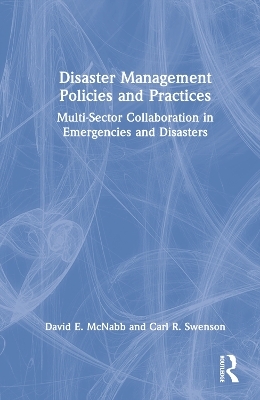
Disaster Management Policies and Practices
Routledge (Verlag)
978-1-032-31560-7 (ISBN)
Merging the historic, academic, and practical aspects of emergency planning and disaster response, the book fills in the missing pieces for creating a guide to understanding the nature and breadth of the work ahead. The authors focus on the principles, framework, and structure of emergency preparedness planning and disaster response and recovery. In doing so, they draw on an extensive literature review, combined with relevant practical examples and insights to create a detailed picture of how to prepare for and respond to the increasing array of emergency crisis and disaster management.
Disaster Management Policies and Practices provides a solid foundation in emergency preparedness and disaster response for practitioners, public managers, and those who aspire to such positions. It is designed for use as a resource for scholarly research in the theory and practice of emergency response, public administration, public policy, and governance.
David E. McNabb is Professor Emeritus at the Pacific Lutheran University School of Business, USA. He has taught undergraduate and graduate business and administration courses for the University of Maryland-University College, the American University in Bulgaria, the Stockholm School of Economics in Riga, Latvia, and the MPA program at Evergreen State College, Olympia, Washington. Carl R. Swenson has 35 years of experience managing cities in Arizona, Illinois, and Washington. He is a life member of the International City/County Management Association (ICMA) and is recognized as a credentialed city manager (retired), and a legacy leader in professional city and county management.
1. Nature of Emergency Management 2. Emergency Management Framework 3. Collaborative Disaster Governance 4. Disaster Response Models 5. Hazard Mitigation and Remediation 6. Emergency Project Management Framework 7. Emergency Management Responsibilities 8. Collaborative Emergency Management 9. Nongovernment Partnerships 10. Emergency and Disaster Partnerships 11. Supporting Community Lifelines 12. Sustaining Social and Economic Continuity 13. Managing a Pandemic Disaster 14. Wildfire Disaster Governance 15. Windstorm-Driven Disaster Governance 16. Flood Disaster Governance 17. Infrastructure and Housing Emergency Governance 18. Conclusion: Preparing for Future Disasters Afterword Appendix A: Classification of Potential Hazards Appendix B: Descriptions of Plausible FEMA Operations Appendix C: Definitions of Standardized Incident Impacts Appendix D: National Incident Management System Excerpts Appendix E: Suggested Emergency Response Preparedness Checklist Items
| Erscheinungsdatum | 20.09.2022 |
|---|---|
| Zusatzinfo | 34 Tables, black and white; 5 Line drawings, black and white; 5 Illustrations, black and white |
| Verlagsort | London |
| Sprache | englisch |
| Maße | 152 x 229 mm |
| Gewicht | 757 g |
| Themenwelt | Naturwissenschaften ► Biologie ► Ökologie / Naturschutz |
| Naturwissenschaften ► Geowissenschaften ► Geografie / Kartografie | |
| Sozialwissenschaften ► Politik / Verwaltung ► Staat / Verwaltung | |
| Sozialwissenschaften ► Soziologie | |
| ISBN-10 | 1-032-31560-1 / 1032315601 |
| ISBN-13 | 978-1-032-31560-7 / 9781032315607 |
| Zustand | Neuware |
| Haben Sie eine Frage zum Produkt? |
aus dem Bereich


